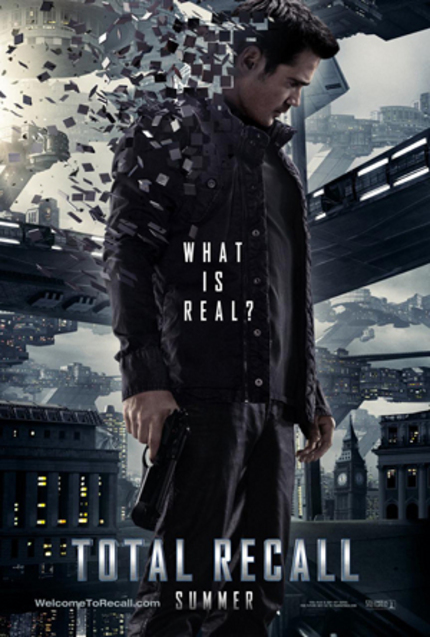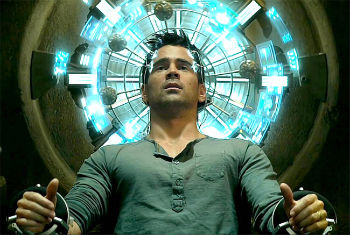Review: TOTAL RECALL is Completely Forgettable

Two or three explanatory sentences quickly whizz by at the beginning of Len Wiseman's Total Recall, setting up a different world than the one created by Paul Verhoeven's 1990 film version of Philip K. Dick's story "We Can Remember It For You Wholesale," first published in 1966.
In brief, something really bad happens in the future, rendering the entire world uninhabitable, save for the United Federation of Britain (UFB) and the Colony, as future people evidently refer to the former Australia and/or New Zealand. (I was taking notes, but the graphics whizz by awfully fast.) Also in the future, a new transportation system has been built, providing a super-fast direct connection between UFB and the Colony through the center of the Earth. (Boy, those graphics are on and off screen fast, brother!)
Cohaagen (Bryan Cranston), UFB's unquestioned leader, rules with an iron fist, backed by an army of humans, and also robot soldiers called Synthetics, which are made in factories like the one where our putative hero, Douglas Quaid (Colin Farrell) toils with increasing disgruntlement. Doug is married to the amazingly beautiful and fit Lori (Kate Beckinsale), and he has a best friend named Harry (Bokeem Woodbine), but, see, he keeps having these dreams, weird dreams where he's running around with another beautiful and fit woman (Jessica Biel) while dangerous people with guns are chasing them, and it seems so real ...
If you've seen the original version multiple times, as I have, then you know where the story is going; if you haven't seen it, I won't spoil it. (The above description covers no more than the first 10 minutes or so.)
Those first 10 minutes firmly establish that Total Recall exists in the same stylistic realm as Wiseman's Underworld and Underworld: Evolution -- with a tight color palette, mostly confined to dark blues, greys, and inky blacks -- and shares the same lack of affinity for classic action traditions as Live Free or Die Hard. In other words, they are well-nigh incomprehensible, as far as being able to locate and/or recognize the characters within each scene. It's all a blur of motion and speed and bloodless PG-13 violence, which provides as much excitement as watching an electric blender in action. And as the chopped-up bits accumulate, any interest that might have been generated by the potential of the premise is steadily dissipated.
Tempting as it is to lay all the responsibility for the film's woeful quality solely on Wiseman, there's plenty of blame to go around.
 The numerous extended action sequences are cut by Christian Wagner in the same manner as his editing work on films by Michael Bay, Tony Scott, and Justin Lin, so if you love those films, you may be in luck. Likewise, Paul Cameron, a fellow colloborator of Tony Scott, served as director of photography, so you can rest assured that the numerous lens flares are entirely intentional.
The numerous extended action sequences are cut by Christian Wagner in the same manner as his editing work on films by Michael Bay, Tony Scott, and Justin Lin, so if you love those films, you may be in luck. Likewise, Paul Cameron, a fellow colloborator of Tony Scott, served as director of photography, so you can rest assured that the numerous lens flares are entirely intentional.
In front of the camera, Farrell acts like a man whose memory has been wiped clean and replaced with styrofoam. (And it's not like the bar for the role was set terribly high by Arnold Schwarzennegger in the first place.) Beckinsale remains cold and calculating, as though her character from Underworld had been transplated to the future. Biel emotes admirably, but cannot generate any chemistry with Farrell, which undermines a key element of the story. Cranston is given precious little screen time and is memorable only for his silly hair style (or hair piece). Woodbine is fine in a small role, as is John Cho, but Bill Nighy can't do anything with his anemic character.
The script, for which Kurt Wimmer and Mark Bomback are credited, fails to establish what, exactly, is at stake for the people of Planet Earth. Without a clear understanding of the stakes, the characters lack any motivation for their actions, other than a vague sense of "kinda good" vs. "sorta bad." As far as it goes, the motivation is provided by someone saying "Catch that guy," someone questioning "Why?", and receiving the answer: "Because I say so!"
Beyond a sprinkling of homages to the 1990 version, the reboot's limited strengths are displayed in the highly-detailed special effects, the strong production design, and some of the futuristic ideas for products that are showcased. (Although even in these areas, the film's debts to Blade Runner and I, Robot are inescapable.) Again, those are things that Len Wiseman knows how to handle, and handle pretty well; but action and story and characters and acting, not so much.
Perhaps it all comes back to producer Neal Moritz, whose films have grossed more than $5 billion at the box office. Scrolling through a list of his credits is rather a dispiriting experience, much like sitting through Total Recall, whose sole ambition is to make money as efficiently as possible, like a stylish yet counterfeit product spit out by an assembly line in a factory.
In that, Moritz may succeed once again, even if no one remembers this pallid remake after the closing credits roll.
Total Recall opens in Hong Kong, Singapore, Thailand, Canada, and the U.S. on Friday, August 3.







